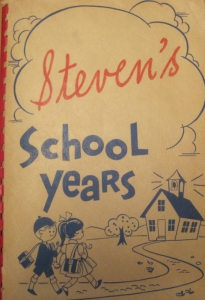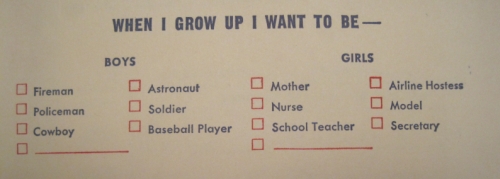 Shortly before I started Kindergarten, my mother purchased a book called “Steven’s School Years”, with pockets to store my report cards and school projects, and questionnaires for me to fill out at the end of each school year.
Shortly before I started Kindergarten, my mother purchased a book called “Steven’s School Years”, with pockets to store my report cards and school projects, and questionnaires for me to fill out at the end of each school year.
I was not diligent about filling in the questionnaires, and they remain mostly blank. But had I been forced to, I wonder how I would have answered the following question, which was to be answered annually at the end of Grades 1,2,3,4,5, and 6:

(According to my mother, my ambition at age three was to be an electric drill, and sometime after that a rabbit. No other records of my early career inclinations seem to have survived.)
Although the boys seem to have been offered the more exotic options, my wife points out that the girls, by and large, were offered the more realistic ones, and were therefore perhaps (ever so slightly) better served by this book. Do you agree with her?



It rather depends what the purpose of the book is. If it was to offer practical careers advice to the under 8’s, then arguably the girls were better served, although fireman, policeman and soldier are very attainable choices. If it was to inspire and motivate, then they were very much less well served. Why bother with hard work at school when you choices are limited to mother and model. It is no surprise there is an earnings gap when children are so indoctrinated from the age of four (and before).
Are you sure a rabbit is not a euphemism for something?
From today’s perspective it is stunning just how sexist things were not all that long ago. Whilst things have improved, I don’t think we have shrugged off all traces.
Sure — for a drill.
Apparently Landsburg was always precocious.
I said no such thing about being better served! At least the boys were encouraged to reach.
Since the post quotes both my mother and my wife, I should clarify that Lisa (chiming in with “I said no such thing!”) is the wife, not the mother. Perhaps we’ll hear from my mother before the day is out. (I should add that the bit about the electric drill and the rabbit is something my mom told me when I was roughly 12, I think. So it’s possible that one or both of our memories will be hazy on this matter.)
OK, GANG, WE HAVE AN OUTSIDER IN CLASS TODAY. Time to mortify the professor!
So Ms. Landsburg — may I call you Lisa? — our best reports suggest that Steven’s earliest ambitions were to be a drill and a rabbit. Would you care to comment?
(*barely suppressed snicker*)
Ah, Steve—I don’t remember anything about the “electric drill”. However, the “Rabbit” may have been “Rabbi”.
Delighted with the path you’ve chosen, Electric Drill” would have been disastrous for you and all you were in contact with.
Shouldn’t there be check boxes by the BOYS and GIRLS options?
It is hard to say who was better served by the list, but one of my pet peeves are real life guidance counselors who say “Do what you love for a living”. No one that I know loves accounting but it earns a good living. Few people love what I do for a job, which is computer programming. Better advice would be to try to find something that is in demand and that you have enough natural talent at to develop a enough comparative advantage to get a job.
@Harold —
A caveat about the “wage gap”. The notorious “77% of what men earn in the U.S.” figure comes from comparing *all* wages earned by men with *all* wages earned by women. If you want to measure the effect of sexism, I think it makes more sense to look at young, single, childless workers. Otherwise, the wage gap is widened by parenthood (where the woman’s career is interrupted more dramatically than the man’s, and of course if a single parent is raising a kid that resulted from a one-night stand, it’s almost always the mother), and married couples (where if the couple decides they can get by on one income, it’s disproportionately the wife who quits their job, and that’s the couple’s decision).
The only study I’m aware of that looks at relative wages of young, single, childless men and women, found that women in their sample actually got paid 8% *more* than men:
http://www.politifact.com/punditfact/statements/2014/apr/09/genevieve-wood/what-pay-gap-young-women-out-earn-men-cities-gop-p/
That shouldn’t be too surprising, if men and women start out with equal abilities but women also benefit more from preferential scholarship programs and anti-discrimination laws.
The more general finding from those studies is that the wage gap almost disappears when you compare men and women with similar qualifications working similar hours. The 77% nationwide figure is due to men working more and longer hours; in the study finding that single childless women got paid 8% more than men, the women in their sample graduated college at a higher rate.
What struck me by the list was that 4 out of 6 of the boy’s occupations were obviously government employees, while only 1 out 6 of the girl’s were. Of the 2 others for the boys, neither were particularly realistic.
Bennet Haselton “The notorious “77% of what men earn in the U.S.” figure comes from comparing *all* wages earned by men with *all* wages earned by women.”
I am thinking of sexism affecting career choices, not sexism by employers. If girls are directed towards low-earning jobs, then they will earn less than men.
From the link: “If you compare women to men in the same job with similar background, similar experiences that they bring to the table, the wage gap all but disappears,” and
“PolitiFact has given you the nuts and bolts about the 77 cents statistic — you can read the two most important works in this area here and here. Basically, there is a wage gap, but it tends to disappear when you compare women and men in the exact same jobs who have the same levels of experience and education.”
However, if women are encouraged as children towards the low paying jobs, then this statement could be both true and entirely consistent with a sexist society where women are paid less.
We see from the above that girls and boys were strongly encouraged towards very different employment choices in the not so distant past.
I do not believe this has totally disappeared, although it is much improved. For example, the fairly recent film “The Fockers” has a thread about the man choosing to be a nurse which has strong hangover from this sexist view of things.
This is not just damaging to girls; such polarisation pushes boys away from employment choices they may prefer, and denies the rest of us the benefits of their contribution.
Nobody.really is lowering the tone with sniggering from the back there. As soon as we mention sex…ism he can’t control himself (herself?). The drill would have to be a hammer drill probably.
I feel that the option “curmudgeon” is missing.
“Nobody.really is lowering the tone with sniggering from the back there.”
He is. And I thank him for the chuckle!
I’m guessing that the aim of the book was more to amuse parents than to serve/inspire/offer career advise to the children.
@ khodge #17 – Maybe the child was supposed to circle either “boys” or “girls,” depending on his or her desire. Perhaps this partially explains why a young Steven Landsburg didn’t bother to fill out the questionnaire once he spotted the absence of “drill” and “rabbit” options.
I’m also reminded of Walt Disney’s The Sword in the Stone, in which Merlin transforms a young King Arthur into a squirrel and is then subsequently chased around by a swooning female squirrel.
ARTHUR: “I’m not a boy!”
SQUIRREL: “You are too.”
ARTHUR: “I mean, I’m not a squirrel, I’m a boy, a human boy.”
Not as funny as the Madam Mim scene, but far more relevant.